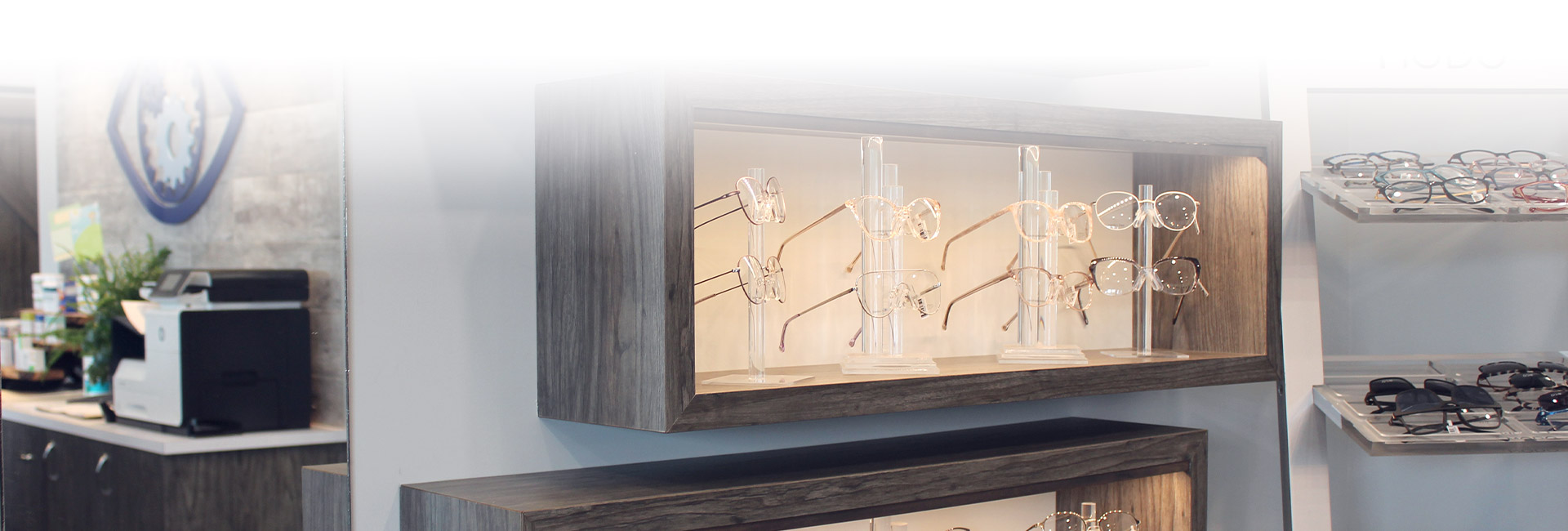Myopia, or nearsightedness, is an increasingly common condition. If you’ve noticed your child squinting to see distant objects, moving closer to the television, or struggling in the back row at school, you may already be familiar with its challenges. Options like MiYOSMART lenses now offer an innovative, non-invasive solution to slow the progression of myopia.
MiYOSMART lenses have a special design with 2 parts: a clear center for regular vision and a ring around it with tiny zones that slightly defocus vision. This special design helps slow the progression of nearsightedness while providing clear eyesight.
What Is Myopia?
Myopia—or nearsightedness—causes distant objects to appear blurry while nearby objects remain clear. It occurs when the eye grows too long or the cornea becomes too curved, causing light to focus in front of the retina instead of directly on it.
Symptoms of myopia include:
- Blurry vision when looking at things that are far away
- Headaches
- Eyestrain
- Poor focus and attention span
- Poor academic performance
- Holding objects like books close to the face.

Why Is Myopia on the Rise?
Research suggests that lifestyle factors play a significant role in the increasing rates of myopia. Spending long hours on screens, limited time outdoors, and a rise in near work, such as reading or studying, are all linked to its growth.
When left unmanaged, myopia can worsen over time and lead to a higher risk of serious eye diseases such as retinal detachment, glaucoma, or myopic maculopathy. This is why early intervention is crucial for children with progressing myopia—and why products like MiYOSMART lenses are so important.
What Are MiYOSMART Lenses?
Developed by HOYA, MiYOSMART lenses are designed to manage myopia. Unlike traditional lenses, which simply correct nearsightedness for clearer vision, MiYOSMART lenses actively help slow its progression.
These lenses are non-invasive, safe, and easy to incorporate into everyday wear, making them ideal for children and young adults.
How Do MiYOSMART Lenses Work?
The secret behind MiYOSMART lenses lies in their Defocus Incorporated Multiple Segments (D.I.M.S.) technology. This innovative design features a series of small segments on the lens surface that create specific defocus zones. These zones help slow the eye’s growth rate, effectively reducing myopia progression over time.
Here’s how they work:
- The centre of the lens corrects vision for clear eyesight, just like traditional glasses.
- Surrounding the clear lens is a ring-shaped treatment zone that slows myopia progression.
MiYOSMART lenses slow myopia progression by approximately 60% in children.
The Benefits of MiYOSMART Lenses
MiYOSMART lenses offer several unique advantages.
Non-Invasive & Comfortable
Unlike treatments such as eye drops or orthokeratology (overnight lenses), MiYOSMART lenses are as convenient to use as standard eyeglasses. There’s no need for complex routines, making them perfect for kids.
Durable & Safe
MiYOSMART lenses are made from impact-resistant polycarbonate material that protects against daily wear and tear. From playground bumps to after-school activities, these lenses are built with active kids in mind.
Clear Vision & Myopia Control in One
There’s no need to choose between vision correction and myopia management—you get both in one lens. MiYOSMART lenses deliver clear, comfortable vision while providing long-term myopia management.
Seamless Adaptation
MiYOSMART lenses are designed to integrate effortlessly into a child’s lifestyle and can be fitted into regular eyeglass frames.
Get MiYOSMART Lenses for Your Child
If you’re considering MiYOSMART lenses for your child, here’s how to take the first step:
1. Schedule a Comprehensive Eye Exam
Start by consulting an optometrist who offers myopia control. They’ll assess your child’s vision, determine the severity of their myopia, and recommend personalized solutions.
2. Discuss Myopia Control
Ask your optometrist about your child’s myopia control options, including MiYOSMART. They can explain how different options work and their benefits to your child in the long run.
3. Ensure Regular Follow-Ups
After receiving the lenses, attend regular follow-up appointments with your child’s eye doctor to ensure the myopia management plan is effective and make adjustments if needed.
Make a Myopia-Friendly Environment at Home
While MiYOSMART lenses can help manage myopia progression, a few lifestyle changes can further support your child’s vision:
- Encourage outdoor play: Spending at least 2 hours outside every day can help reduce the risk of myopia progression.
- Limit screen time: Excessive close work, especially for kids under 3, is a key risk factor for myopia. Limiting screen use supports healthy eye development.
- Promote the 20-20-20 rule: Teach your kids to reduce digital eye strain by looking at something 20 feet away for 20 seconds every 20 minutes of near work.
- Create a healthy workspace: Ensure their study area is well-lit and ergonomic to minimize eye strain.
- Teach good reading habits: Encourage them to keep at least 12 inches of distance from books or screens while reading.
Get Help with Myopia Management
Myopia is a complex condition, but with proper care, its progression can be managed. A comprehensive eye exam helps detect early signs of myopia and provides the opportunity for timely intervention. At Beyond 20/20 Optometry, we offer personalized myopia control solutions tailored to your child’s needs. Contact us today to learn more or schedule a children’s eye exam—we’re here to support your child’s vision every step of the way.




